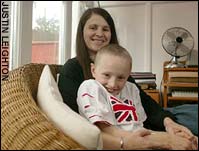Untitled Document
 |
Dawn James says her son Sam
became withdrawn on Ritalin |
The number of children being prescribed drugs for so-called behavioural
disorders has soared to a record high, causing alarm that children are being
unnecessarily "drugged into submission".
Prescriptions of Methylphenidate - most commonly sold as Ritalin - rose to
359,100 last year, a rise of 344,400 since 1995. Figures from the Prescriptions
Pricing Authority reveal that there has been a 180-fold increase in prescriptions
since 1991 when only 2,000 were issued in England.
The growing use of Ritalin - an amphetamine-based stimulant which improves concentration
and is nicknamed the "chemical cosh" because of its calming effects
- has alarmed critics. It is almost entirely prescribed to children under 16 in
this country. Controversially, it has been estimated that one in 20 children suffers
behavioural disorders such as attention-deficit hyperactivity disorder or ADHD,
for which Ritalin is prescribed.
But critics of the drug say that doctors give it to children who are merely
displaying normal emotional changes experienced during childhood. Campaigners
believe that the increasing use of Ritalin follows the trend in America where
it has been prescribed to children as young as 15 months.
Last night, the Citizens Commission on Human Rights, an organisation that campaigns
against psychiatric violations of human rights, condemned the increasing prescription
of drugs for children. "Too many psychiatrists are being irresponsible
in prescribing mood-altering drugs which are pharmacologically similar to cocaine,
and then claiming they have 'cured' children of their 'condition'," said
a spokesman.
"Some children may be a little boisterous but psychiatry's fixation on
labelling such difficulties and prescribing medication is nothing more than
pseudo science. Children are being drugged into submission."
There are currently no medical tests for ADHD and children are diagnosed on
the basis of their behaviour and questionnaires that ask if a child displays
symptoms including restlessness, inattentiveness and fidgeting. Sami Timimi,
a consultant child expert and adolescent psychiatrist based in Lincolnshire,
described the soaring use of Ritalin as "a scandal" and insisted that
the drug should be used only as a last resort.
"It is ludicrous that the normal spectrum of behaviour that all kids will
demonstrate at some time in their childhood is now interpreted as a disorder
which requires medication," he said.
"Various methods of behaviour management therapy and a change in diet
are often all a child needs but adults are increasingly turning over the role
of parenting to professionals who feel more "doctory" if they can
make a diagnosis and prescribe medication."
Dr Timimi said that not enough parents were aware of the potential health risks
and side-effects associated with Ritalin, which include loss of appetite, insomnia
and unresponsiveness.
A recent survey that compared international prescription rates for children
of antidepressants and mood-altering drugs including Ritalin showed that Britain
has the highest rate in the world.
Research in the United States found that Ritalin may cause lasting changes
to the brain. In a study carried out by the Harvard Medical School, healthy
rats given the drug in their infancy were found to have a reduced sense of pleasure
and were more prone to signs of despair during adulthood.
Prof Sir Alan Craft, the president of the Royal College of Paediatrics and
Child Health, said that the growing use of Ritalin was "concerning".
Prof Peter Hill, an ADHD specialist and honorary consultant in child psychiatry
at the Great Ormond Street Hospital in London, believes that the concept of
ADHD has become popular, "partly because it offers an alternative explanation
for antisocial behaviour, other than imperfect parenting".
"While Methylphenidate undoubtedly works for some children, clinicians
are under increasing pressure from vast waiting lists to see people as quickly
as possible, resulting in some medicating where it is perhaps not necessary,"
he said.
"I have children coming to me who have been prescribed all sorts of medication
without much preparatory work-up."
Janice Hill, the founder of the Overload Network, a charity that campaigns
against the prescription of drugs to children, said that parents were not being
given enough information on alternative treatment. "Doctors are far too
quick to medicate drugs as a quick-fix answer, instead of recommending therapy
or properly analysing the root causes of a child's anxiety," she said.
Sam James, an eight-year-old schoolboy from Reading, was diagnosed with ADHD
and prescribed Ritalin when he was just two years old, after showing symptoms
including fidgeting and constant screaming.
However, his mother was so shocked by the effects of the drug that she took
him off the medication after four weeks.
"The results were unbelievably horrific," said Mrs James, 34. "Within
a matter of weeks Sam went from being a lively boy to a zombie who sat on a
chair in the corner rocking.
"He became completely withdrawn and uncommunicative and I could hardly
recognise him as my son."
After taking him off Ritalin, which costs around £6 for one month's supply,
Sam's psychiatrist, who has since been struck off the medical register, prescribed
yet another sedative over the telephone, which Mrs James did not give to her
son.
"We found that using cognitive behaviour therapy and just talking to our
son has been much more helpful than medication," she said.
"Having seen the effects of Ritalin on Sam, I would advise parents to
try any other avenue before resorting to drugs."

